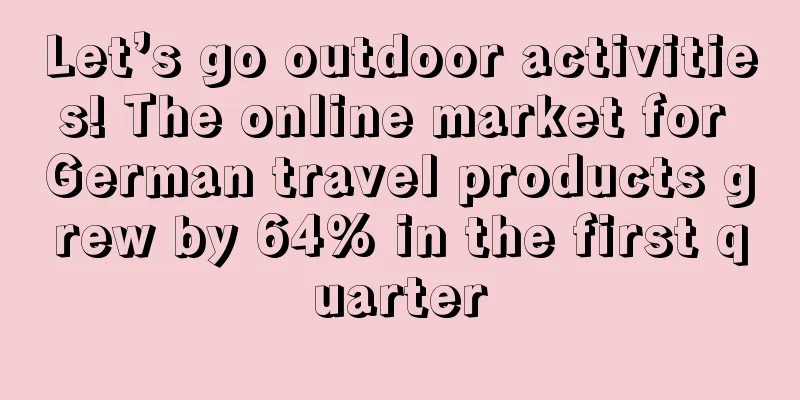Let’s go outdoor activities! The online market for German travel products grew by 64% in the first quarter

|
Since the Russia-Ukraine conflict, global economic development has been affected to varying degrees, and e-commerce sales in various countries have also slowed down significantly .
Recently, the German Federal E-Commerce Association Bevh released a report on the development of German e-commerce sales in the first quarter , which mainly compared the development of e-commerce sales after the start of the Russian-Ukrainian conflict on February 24. The report shows that from the beginning of January to the start of the Russian-Ukrainian conflict , online transactions for clothing and shoes increased by 10% year-on-year, while sales fell sharply by 8.6% after the conflict began , and the fashion category only grew by 3.2% in the first quarter .
The online growth trend of fashion categories has slowed down, similar to the trend of home products, which have always grown steadily . It is reported that the online sales growth rate of furniture was 13.9% before the Russian-Ukrainian conflict , and only increased by 0.3% after the conflict began . In the first quarter, the online sales of home products increased by 9% . Compared with the previous quarter, e-commerce sales increased by 23.7% , and increased by 2.3% compared with the same period last year .
After the start of the Russia-Ukraine conflict, pharmaceuticals reached a new high after the epidemic, with online sales increasing by 40% in the first quarter and sales of 407 million euros , an increase of 23.5% from 329 million euros in the first quarter of 2021 .
As the epidemic is gradually lifted, Germany's tourism industry is gradually recovering. In the first quarter, Germany's online tourism sales increased by 64.2% to 1.85 billion euros , compared with 1.13 billion euros in the same period last year , but still less than half of the first quarter of 2020 (3.89 billion euros). Before the Russian-Ukrainian conflict, online tourism sales almost doubled ( 93.3%), but fell back to 13.4% after the conflict began .
Driven by Christmas, German e-commerce sales grew 11.5% in the fourth quarter of 2021, with revenue reaching 21 billion euros . In the first quarter of 2022 , German consumer e-commerce sales were approximately 22.8 billion euros, up 8.2% from the previous quarter .
Although the growth of German e-commerce sales has slowed down suddenly due to the conflict between Russia and Ukraine, consumers will face high consumption due to factors such as inflation crisis, supply chain problems and raw material costs. To break this spending crisis, online shopping will attract more attention from consumers. Sellers can continue to wait and see the market and make preparations for product selection. Germany E-commerce travel |
<<: Bicycle market is booming, and related accessories are selling well
>>: Japan's April website traffic rankings released! Amazon visits declined
Recommend
A big seller revealed that he owed tens of millions in taxes?
After the honeymoon period, disputes between Dama...
What is Premium Shipping? Premium Shipping Review, Features
Premium Shipping is a service launched by Amazon ...
What is Nisshin? Nisshin Review, Features
NIHK (Hangzhou Jienxi Network Technology Co., Ltd....
Cross-border transactions will reach $156 trillion in 2022! Free shipping is awesome...
The increase in the penetration rate of smartphon...
158 illegal import cases! The Korean Customs Administration announced the results of a survey of major e-commerce companies
According to the Korea Customs Service, since 201...
Officially launched on April 21! Wish A+ new logistics route is launched
According to the platform notification, the A+ lo...
Quick view for sellers: Advertising statistics of various channels (Part 2)
How is the advertising development status of diff...
There are new changes in Amazon front-end search!
In recent times, Amazon has been constantly makin...
What is Traceability Code Service? Traceability Code Service Review, Features
<span data-docs-delta="[[20,{"gallery"...
What is Giropay? Giropay Review, Features
Giropay is a German internet payment system based ...
SHEIN launches new plan to help sellers achieve $1 million in sales in 3 years
SHEIN , a global integrated fashion and lifestyle...
Shenzhen seller was sued for owing 26 million yuan!
Recently, it was revealed that Youkeshu, one of t...
Amazon US: Launches Return Provider Program for Self-delivery Sellers
Recently , Amazon US issued an announcement , ann...
Foreigners complained that the word "peanut" was printed incorrectly on the air fryer bought from Temu
Recently, a foreign consumer who bought an air fr...
A large number of sellers received address verification emails, and Amazon tightened its store opening regulations again...
In addition, Amazon has tightened registration ag...









